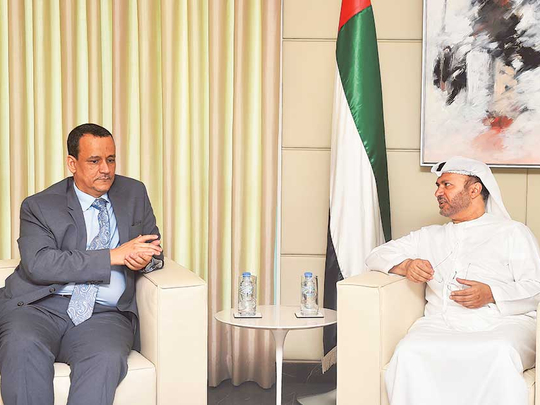
Abu Dhabi: The UAE offered Dh4.34 billion in foreign aid to Yemen from April 2015 to July 2016 as part of its humanitarian and development aid to support the Yemeni people and its ongoing efforts to lay down the foundations for development, security, stability and peace in the Arab Republic of Yemen.
“The UAE is on the forefront of countries sending relief to Yemen,” Reem Bint Ebrahim Al Hashemi, Minister of State for International Cooperation, said,
“We stand with the Yemeni people by providing all forms of assistance,” she added.
Humanitarian campaigns are a key part of the UAE foreign policy, she said, adding that they come under the directives of the UAE leadership, represented by by President His Highness Shaikh Khalifa Bin Zayed Al Nahyan, His Highness Shaikh Mohammad Bin Rashid Al Maktoum, Vice President and Prime Minister and Ruler of Dubai, and His Highness Shaikh Mohammad Bin Zayed Al Nahyan, Crown Prince of Abu Dhabi and Deputy Supreme Commander of the UAE Armed Forces, and based on the approach of the founding father, the late Shaikh Zayed Bin Sultan Al Nahyan.
Foreign aid to Yemen is delivered in three categories: development, humanitarian and charity, the Ministry of Foreign Affairs said.
A breakdown of the UAE foreign aid to Yemen by sector showed that humanitarian aid and emergency relief stood at Dh1.48b, representing 34.2 per cent of the total UAE foreign aid to Yemen during the period under review.
The UAE sent more than 160,000 tonnes of food material and more than 111,000 tonnes of medicines and medical supplies in addition to the delivery of a number of ambulances and medical equipment.
Some 135 tonnes of food and non-food items and shelter materials were airlifted to relieve people affected by cyclones Chapala and Meg which hit the Yemeni island of Socotra and southern coasts of Yemen in November 2015.
As for development aid, the report revealed that Yemen received Dhs 2.85b of which Dhs 800.9m was earmarked for the energy and electricity sector, where the UAE bore the operational expenses of energy generation and supply.
It supplied fuels and gas for the power generation plants as well as power generators.
It also contracted local companies to operate and maintain these facilities in a number of governorates including Aden.
Five power generation stations were built, including two new ones in the Governorate of Aden.
The UAE also supplied diesel, fuel and gas for power stations, hospitals, schools and public institutions in a number of governorates.
In the transport and storage sector, Dhs 466.1m were spent to provide equipment and vehicles for transport, water and fuel tankers to Aden, Marib and other governorates. The UAE has rebuilt airports and seaports in Aden and Socotra.
The UAE also channelled Dhs 210.1m into the health sector with emphasis on reconstruction of health facilities.
The UAE renovated 17 clinics including nine health centres in the governorates of Hadramaut, Marib, Mahrah and Taiz, an artificial limb services centre, a kidney dialysis unit, a maternity centre, two centres for people with special needs and a mobile clinic.
The UAE also funded the rehabilitation of Al Joumhouria Hospital in Aden and provided it with medical equipment.
A total assistance of Dhs 160.1m were allocated for the education sector to provide stationery, supplies and bags.
Some 212 schools - including 144 in Aden - were rebuilt and renovated in different governorates, while 32 schools were renovated in Socotra.
In the water and sanitation sector, the UAE rehabilitated the sewerage networks in Aden and the Shaikh Othman Directorate. Work also commenced on the Shaikha Fatima project for building 150 small irrigation ditches and the renovation of three water stations.
In support of the law enforcement agencies, the UAE assistance included training of police forces, delivery of vehicles to the local police and coast guards, renovation of 17 police centres and Aden central jail, and provision of firefighting supplies to the civil defence.
Assistance to the social services sector included rehabilitation of the corniche and eight parks in Aden. The UAE launched small scale projects such as retail shops to increase income of families.












